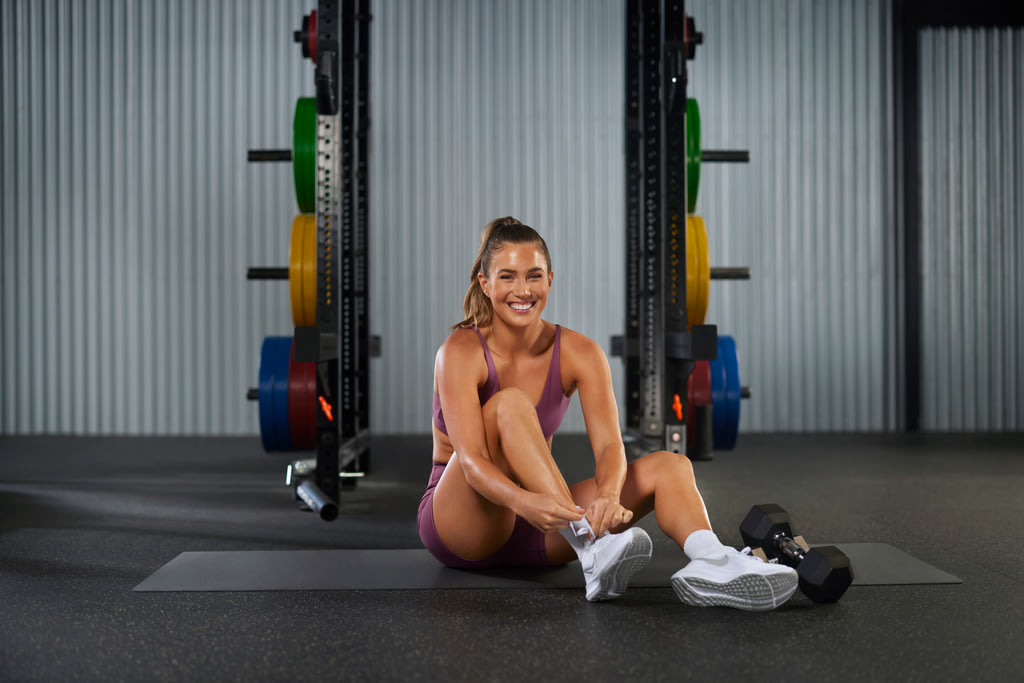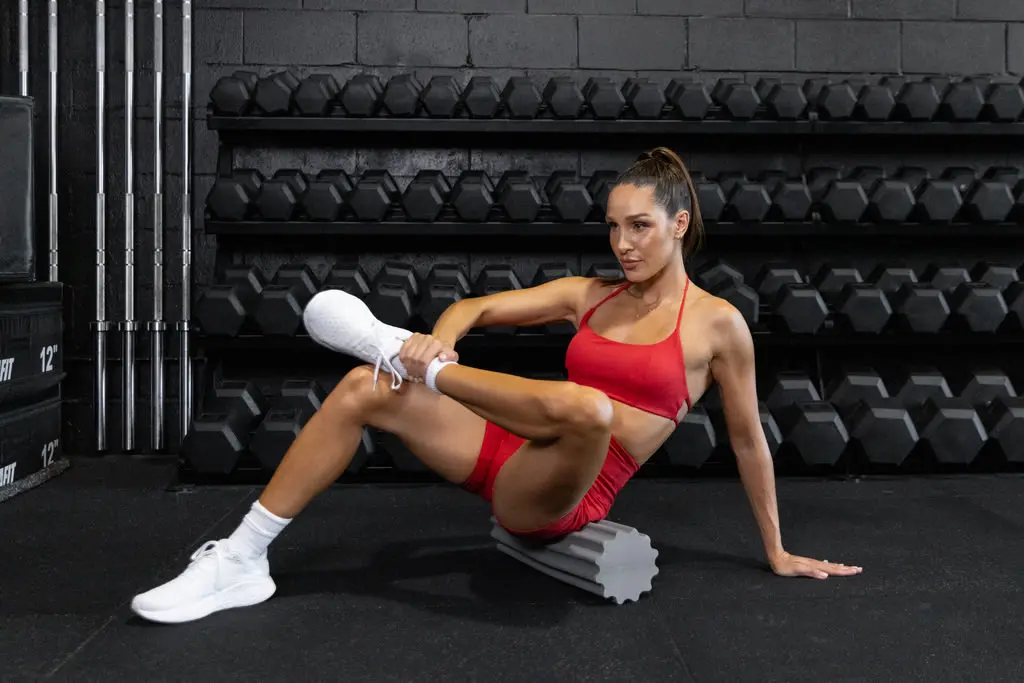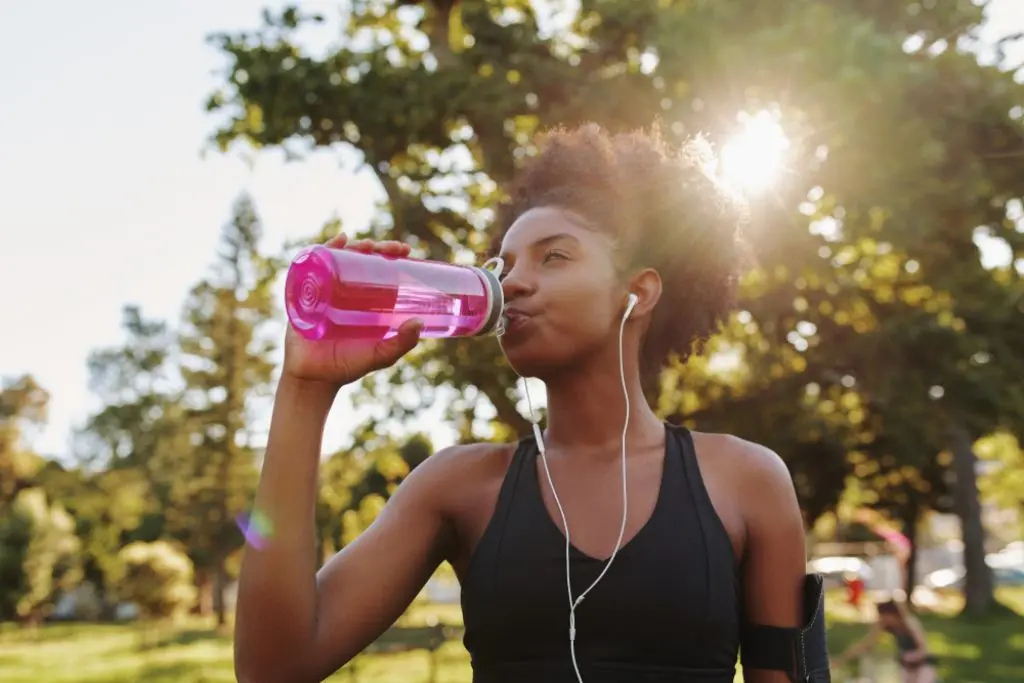What To Do After A Workout
From maximising your muscle recovery to freshening up, make the time you have after your Sweat session count.

January 4, 2023 - Updated July 25, 2024

We talk a lot about the importance of your pre-workout routine, including eating nutritious foods that fuel you, making sure you’re well hydrated, and ensuring you have enough time to fit in a good warm-up, but it’s easy to forget about your post-workout routine.
Ever finished your workout, then left in a mad dash to get to your next appointment (or plopped straight onto the couch in a sweaty heap)? Yep, us too.
Your post-workout routine doesn’t need to be time-consuming or expensive, but your future self will definitely thank you for prioritising yourself after a Sweat session. After all, a good post-workout routine is all about taking care of your body, maximising your recovery and results, avoiding injury, and doing what you can to be on your A-game for your next session. Here are a few things to think about after you close the Sweat app.
Cool down
Your heart rate and body temperature increase and your blood vessels dilate during exercise, especially if you’re following a high-intensity training style. To allow your temperature and cardiovascular system to gradually return to their normal state, the American Heart Association recommends taking time to cool down. Choose a low-intensity activity - a 5-minute walk or some light pedalling on an exercise bike is a great option! Slowing the pace this way helps to avoid the dizzy, lightheaded or nauseous feeling that can occur if you stop exercising suddenly.

Stretch it out
Performing a few static stretches after your workout is a great way to ease muscle tension, cramping and DOMS (delayed onset muscle soreness), reduce lactic acid, boost recovery and help increase your flexibility and mobility. Of course, you can stretch at any time throughout the day, but The American Heart Association encourages including it in your post-workout routine as it’s most effective when your muscles are warm and pliable.
Focus on stretching the areas of your body you used during your workout, holding each stretch for 10-30 seconds in a position where you can feel the stretch without it being painful. Always stretch both sides, continue to breathe throughout, and avoid bouncing motions while stretching as this can increase your risk of muscle tears.
If limited mobility is something you struggle with, why not incorporate mobility training into your routine? Kelly MacDonald’s Mobility & Strength In Motion program is all about helping you improve how you move and her 3-week Lengthen & Strengthen Challenge is another great way to work on your mobility and strength.
“Mobility is often thought of as just stretching, but it’s so much more than that,” Kelly explains. “Mobility training is about the ability of your joints and the strength of all the stabilising muscles to get your body into different positions.”
Grab a foam roller
If you have a foam roller lying around at home or at the gym, self-massage can be another great way to take care of your muscles. You can do this straight after your workout or opt for later in the day if you’re short on time. According to Harvard Health, just a few minutes of foam rolling can help make your muscles more receptive to stretching, while research from 2017 suggests that massage therapy after strenuous exercise can be effective in alleviating DOMS and improving muscular performance.
There are so many foam roller exercises we love for their ability to level up your muscle recovery, and these also make for a great standalone recovery session if you’ve got some extra time to spare!

Drink up
Rehydrating is one of the most important things to do after exercising, as your body can lose a significant amount of water through your breath and sweat.
As the American Council on Exercise highlights, water is one of your body’s most essential components, helping to regulate temperature, protect your organs, aid digestion, dispel waste and transport nutrients to your cells. Your body is made up of about 70% water!
If you work out regularly (and especially if you live and train in a hot climate) it’s crucial for your health and performance to stay well-hydrated before, during and after your training. Being dehydrated isn’t a good time and can lead to poor recovery, fatigue, dizziness, cramps, constipation, headaches, muscle soreness and loss of coordination.
If you exercise when you’re already dehydrated, your body becomes less able to cool itself efficiently, increasing your risk of heat exhaustion and heat stroke. Drinking around two litres of water a day is the general recommendation, but you’ll need to increase this if you’re working out. Get in the habit of having a big drink of water after every session and prioritising your hydration just as you would your nutrition.
“Hydration is often forgotten in the mad rush of finishing a workout and getting out of the gym,” says Sweat Trainer Katie Martin. “I always aim to drink about 500-750ml over the span of my workout and for about 30 minutes after. It’s great for ensuring I am giving my muscles the best opportunity possible to recover.”
Refuel your tank
Whether it’s a nutritious snack or a full meal, try to eat something containing carbs and protein within an hour of your workout. Protein helps with the repair and growth of muscle tissue, while carbs replenish your glycogen stores to restore your energy levels.
A research review from 2019 has shown that eating protein soon after exercise and throughout your recovery increases the rate of muscle protein synthesis. Knowing what to eat after a workout can really make a difference to your progress and performance!
However, when you should be eating after your training is a different question. You might find yourself reaching for a post-workout snack as soon as your workout ends while others might not be hungry or simply not have the time. The good news is that research suggests you can reap the benefits of a post-workout protein hit for up to 24 hours. However, if you train fasted it’s recommended you consume protein right after your session.

Freshen up
As hungry, tired or in a rush as you might be, washing your hands as soon as you can is a must - the last thing you want is to start touching your face or mouth and transferring bacteria from your gym equipment or floor.
It's also best to get out of your sweaty clothes as soon as possible to avoid any irritation or infections from the buildup of bacteria where moisture has been trapped - especially leggings and underwear.
The American Academy of Dermatology Association also says to consider showering immediately after your workout to rinse away bacteria that can cause clogged pores and skin problems. If you aren’t able to shower straight away, try to change out of your workout clothes and wash or use wipes on your face.
It’s time to chill…
No matter what training style or Sweat program you’re following, your muscles need time to recover and grow stronger, and this happens during your rest time - not your workout time.
Following a training session, try to prioritise some self-care and restful activities to boost your recovery. At the very least, make it a priority to have a good night’s sleep! If you’re doing consecutive workouts, alternate muscle groups or switch up the intensity to avoid overtraining, injury and fatigue.
Tinker with the temperature
This one isn’t a post-workout must-do, more of a quick tip! If you’re looking to maximise your recovery, feel better after exercise and promote better skin health, you could try experimenting with your shower temperature.
Many people use ice baths or cold showers because they find it helps to reduce inflammation and muscle tension, some opt for a lukewarm rinse post-workout to prevent their skin from becoming irritated while others believe a warm shower is best to increase circulation and the flow of nutrients to muscles. There isn’t enough evidence to recommend one over the other, but if either makes you feel better, that’s a win!
Another way to up your temperature is with a sauna. With their popularity booming, you’re probably seeing a lot more of these around - and a lot of people talking about the benefits. Kayla Itsines and Katie Martin both swear by them - but what does the science say? From promoting relaxation and cardiovascular health to reducing muscle soreness, getting sweaty doesn’t always have to mean an intense workout. However, dizziness and dehydration pose the biggest risk with this one, so make sure you’re well-hydrated and feeling well before giving it a go.
Have an attitude of gratitude
Katie Martin and Kelsey Wells are both huge fans of taking a moment to thank yourself post-workout - for taking the time out of your day to move your body, care for yourself and celebrate what your body is capable of.
“When you take the time to get really intentional with what’s happening in your mind too, it’s a game-changer,” says Kelsey, who incorporates moments of gratitude into her Redefine Fitness program because of how much of an impact it has had on her own fitness journey.
“Taking a moment to be grateful for the time you took to move, sweat, lift your heart rate and strengthen your body is super important,” adds Katie. “It may feel weird at first, but I find it helps me stay consistent with my routine and remind myself that I train for longevity, not to chase calories or a certain body type.”
When it comes to boosting your health and fitness, it’s just as important to think about how you take care of yourself after your workouts as it is to challenge yourself during them. What are you going to start doing as part of your post-workout routine? Let us know on the Sweat forum!

A more empowered you starts with Sweat, and our editorial team is here to bring you the latest fitness tips, trainer recommendations, wellbeing news, nutritional advice, nourishing recipes and free workouts.
* Disclaimer: This blog post is not intended to replace the advice of a medical professional. The above information should not be used to diagnose, treat, or prevent any disease or medical condition. Please consult your doctor before making any changes to your diet, sleep methods, daily activity, or fitness routine. Sweat assumes no responsibility for any personal injury or damage sustained by any recommendations, opinions, or advice given in this article.
Fitness